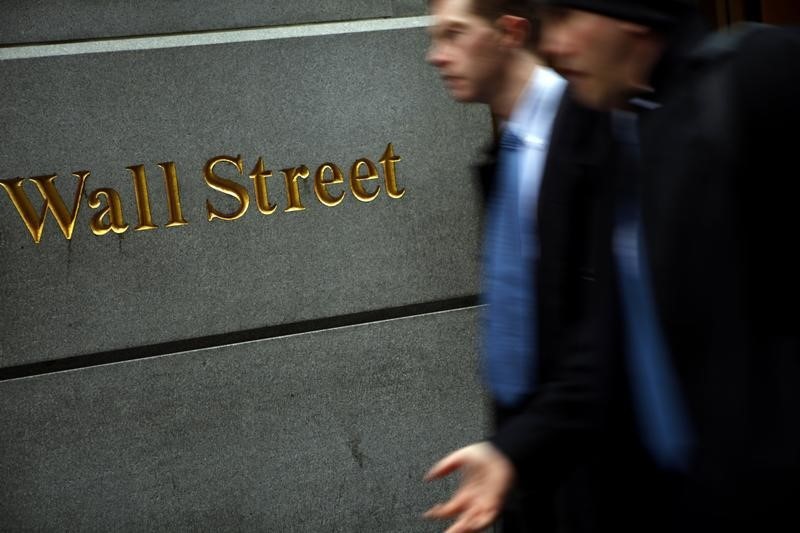Investing.com -- U.S. futures point lower on Wednesday, with traders gauging the potential for Federal Reserve interest rate cuts this year following a hawkish statement from a top official at the central bank. Elsewhere, Walt Disney (NYSE:DIS) rejects a raft of nominees to its board put forward by activist investors, while headwinds against the Chinese economy loom despite the country posting annual growth that beat Beijing's target.
1. U.S. futures slip
U.S. stock futures were lower on Wednesday, pointing to an extension in losses posted in the prior session, as investors weighed fresh commentary about the Federal Reserve's potential interest rate path this year.
By 05:10 ET (10:10 GMT), the Dow futures contract had shed 139 points or 0.4%, S&P 500 futures had fallen by 21 points or 0.4%, and Nasdaq 100 futures had dropped by 97 points or 0.6%.
The main averages in New York dipped on Tuesday, with traders reacting to hawkish language in a closely-watched speech from a top Fed official (see below). A slide in banking stocks following mixed earnings from Wall Street giants Goldman Sachs (NYSE:GS) and Morgan Stanley (NYSE:MS) dragged down the benchmark S&P 500 by 0.4%.
The tech-heavy Nasdaq Composite also moved lower by 0.2%. Apple (NASDAQ:AAPL), one of the index's largest components, declined by 1.2% on news that it was offering discounts on its megapopular iPhone device in China in a bid to combat fierce domestic competition.
Highlighting the economic data calendar today will be the release of December U.S. retail sales. Analysts at ING say a strong month-on-month reading could call into question the market's current pricing of a 62% chance of a Fed rate cut in March.
2. Fed's Waller further douses hopes for imminent rate cuts
Fed Governor Christopher Waller has said that there was no rush for the world's most influential central bank to begin slashing interest rates down from more than two-decade highs, pouring more cold water on already waning hopes that policymakers could start to lower borrowing costs early this year.
In a speech at the Brookings Institution in Washington, D.C., Waller noted that economic activity and labor markets in the U.S. are in "good shape," while inflation is coming down "gradually" to the Fed's stated 2% target.
Because of these trends, Waller argued, he "see[s] no reason to move as quickly or cut as rapidly as in the past."
The comments fueled a jump in the rate-sensitive 2-year Treasury yield and the benchmark 10-year yield on Tuesday. At 05:10 ET on Wednesday, the 2-year yield had added 0.044 percentage points to 4.27% and the 10-year yield had inched down slightly by 0.015 percentage points to 4.05%. Yields tend to move inversely to prices.
3. Disney rejects activist board nominees
Walt Disney has rejected nominees to its board of directors put forward by activist investors, saying that the entertainment behemoth's current leadership team has made "considerable" progress in executing a sweeping overhaul of the company.
In a letter to shareholders, Disney Chief Executive Bob Iger outlined the group's plan to make its streaming business profitable, turn its sports media brand ESPN into a "preeminent" digital platform, improve the output of its film studios, and "turbocharge" its key theme parks division.
"[W]e are continuing to move forward with urgency and clarity," Iger said.
Activist stakeholders, disgruntled by weak streaming returns and box office flops that have led to a slide in Disney's stock price, have been attempting to gain board seats in a bid to influence this revamp. One of the fight's most outspoken figures has been Trian Fund Management boss Nelson Peltz, who has heavily criticized Iger as the "root cause" of Disney's problems.
Trian had previously nominated both Peltz and ex-Disney finance chief Jay Rasulo to the board, while fellow activist Blackwells Capital had tapped three of its own nominees. In a securities filing rejecting these candidates, Disney hit out at Peltz in particular, claiming he had not "presented a single strategic idea."
4. Chinese growth in 2023 tops official target, but headwinds remain
China’s economy grew slightly less than expected in the fourth quarter amid consistent pressure from weak spending and a property market decline, although growth for 2023 managed to just edge past government targets.
Gross domestic product expanded by 5.2% year-on-year in the three months to Dec. 31, data from the National Bureau of Statistics showed on Wednesday. The reading was weaker than expectations for growth of 5.3%, but picked up from the 4.9% seen in the prior quarter.
This brought overall growth for 2023 up to 5.2%, slightly above Beijing’s 5% target. While activity accelerated from the dismal 3% seen in 2022, the stronger number was also driven by a lower base for comparison, given that the country was still grappling with harsh COVID-19 restrictions. Excluding the three years of pandemic-era closures, it was the lowest annual rate of expansion since 1990.
Easing consumer expenditures, a property market meltdown and deflationary pressures all weighed on the Chinese economy throughout last year. New data also showed that the pace the country's population decline quickened in 2023, highlighting the demographic challenges facing the world's second-largest economy.
5. Weak Chinese data hits crude prices
Oil prices retreated Wednesday following the disappointing growth data from China, which exacerbated concerns that the country may not be able to help power global crude growth in 2024.
By 05:12 ET, the U.S. crude futures traded 2.2% lower at $70.91 a barrel, while the Brent contract dropped 2.0% to $76.72 per barrel.
Meanwhile, the U.S. dollar was exchanging hands around a one-month high after comments from the Fed's Waller lowered expectations that interest rate cuts were imminent. Strength in the greenback can hit demand for dollar-denominated oil from buyers paying with other currencies.
